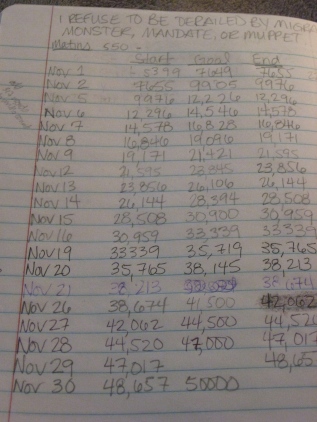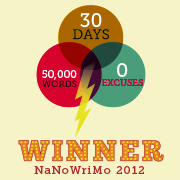Well, friends, it seems as if a future in pig-farming is not imminent, thank goodness. I am beyond thrilled to report that NaNoWriMo was a success for me. Of course, it helped that there were no falling Christmas trees, no snowstorms, no power outages. There were no major illnesses, and only one trip to Urgent Care during the month of November.
At the end of 30 days, I had a complete first draft: a beginning, middle, and end, not to mention characters who spoke to me. In fact, they often wouldn’t shut up.
1. I can start and finish a project quickly.
As I said in my last post, I’ve always considered myself a slow writer. Signing up for NaNoWriMo eliminated any prior conceptions or misconceptions I had about my writing speed. One caveat, though: some serious preparation was key. Before the month started, I designated a composition notebook for this project and brainstormed characters, settings, plot lines, and ideas.
2. I can use an outline.
Who knew? OK, I didn’t really have a true outline, more like a road map, but I pretty much always knew where I needed to go. I did muck around a bit when I got to the middle, but I always went back to my notebook to see what I had planned, or even just to see what possibilities existed.
3. Working five days a week (taking Saturday and Sunday off) really helped me.
The fact is that I have a family and a house as well as other responsibilities. I cannot go into my writing cave for 30 days and come out at the end without some serious consequences. I needed that weekend down time. Come Fridays, my brain was exhausted. Having those few days off gave me time to recharge my batteries, and regroup my characters and plot.
4. I work best first thing in the morning.
When I’m wearing my “mom” hat, my mind has to balance a zillion things at any given time (for example, this week I’ve got to remember band days, piano and cello lessons, two family birthdays, volunteer time at the school library, blogging assignments for two blogs, after-school Latin/chess club/bridge club/library pick-up, cub scouts, a meeting, my husband’s days at his office vs. days at home, third-grade spelling words, an immigration assignment, when the new sofa is being delivered, three Christmas parties, Christmas cards, a Nutcracker performance, a new ballet class I’ll be taking, ski club fitting, and a partridge in a pear tree.)
Do you feel overwhelmed? I do, too, on an hourly basis. Consequently, if I let my day “begin” before getting my words in, I’d never have the focus to get any writing accomplished. So I wrote when I first woke up, before anything else had a chance to rear its needy head. It was much easier to get my words done, and I was frequently done by noon. The rest of the day I felt like I’d accomplished something. I didn’t have that monkey sitting on my back prodding at my guilt gland all the time.
4. I can use other methods of tuning out the world.
On those days when I couldn’t write immediately, or when I didn’t finish by the time the school bus rolled around, I found another way to help my brain focus.
Don’t laugh. Don’t judge. Seriously.
I put on the Pandora new-age music station. I don’t normally write to music; it interferes too much. I start choreographing in my head. Too many memories, too many lyrics, too much sensory input in general.
But since I don’t listen to new-age music, there was nothing to spark a memory. There were no lyrics to give me cause for pause, and so it allowed me to tune-out all the other daily chatter that goes on, both internally and externally, and the words came easier. Strange, but it worked.
5. Quantity eventually leads to quality, and fluency helps get you there.
While writing five days a week helped me balance my other responsibilities, it did  mean that I had to increase my word count from 1667/day to 2250/day. At the back of my notebook, I kept a chart of my daily numbers, with date, starting point, goal, and ending point, as well as the final daily word count to keep track. It got easier to write those words each day.
mean that I had to increase my word count from 1667/day to 2250/day. At the back of my notebook, I kept a chart of my daily numbers, with date, starting point, goal, and ending point, as well as the final daily word count to keep track. It got easier to write those words each day.
 mean that I had to increase my word count from 1667/day to 2250/day. At the back of my notebook, I kept a chart of my daily numbers, with date, starting point, goal, and ending point, as well as the final daily word count to keep track. It got easier to write those words each day.
mean that I had to increase my word count from 1667/day to 2250/day. At the back of my notebook, I kept a chart of my daily numbers, with date, starting point, goal, and ending point, as well as the final daily word count to keep track. It got easier to write those words each day.
You’ll notice I wrote at the top, “I refuse to be derailed by migraine, monster, mandate, or muppet.” That was my way of saying no excuses. During the month of November, all of those things tried to claim my attention. I refused to let them. Even the Muppets — and that was really hard, because they were singing the Banana Boat song with Harry Belafonte.
6. Challenging myself and completing a goal is empowering.
I suffer from the imposter syndrome, but really? An imposter writing a novel in 30 days? No chance. This experience made me feel like a real writer. That’s not to say you can’t be a real writer if you don’t write a novel in 30 days. It just validated me in a way other things have not, even with an MFA from VCFA. I can’t say I’m an imposter anymore. I’m a writer. Of course, it helped that when I finished and verified my word count at the NaNoWriMo web site, I was sent a video of the people at the Office of Lights and Letters cheering for me.
7. The writing community is incredibly supportive. (Even though I already knew this)
While it might have been annoying to lots of people, I posted my daily word count on Facebook. I went public, which is something the NaNoWriMo organizers suggest. It did help, too, to see comments from friends cheering me on. Thanks.
8. My own circle is incredibly supportive.
I recognize that I’m extremely lucky in being able to have a large block of time daily to write. I know many writers hold down other employment, in addition to writing and taking care of family, and I stand in awe of all that they do (I’m looking at you, Annemarie O’Brien, Linden McNeilly, and Varian Johnson). I couldn’t do what I do without the support of my gingerbread man, and the understanding of my gingerbread boys, each of whom lends an ear and keeps me going.
So would I do it again?
Perhaps. If the timing was right…and I start feeling like a pig farmer.
Originally published at Quirk and Quill 12.6.12

Comments
Post a Comment